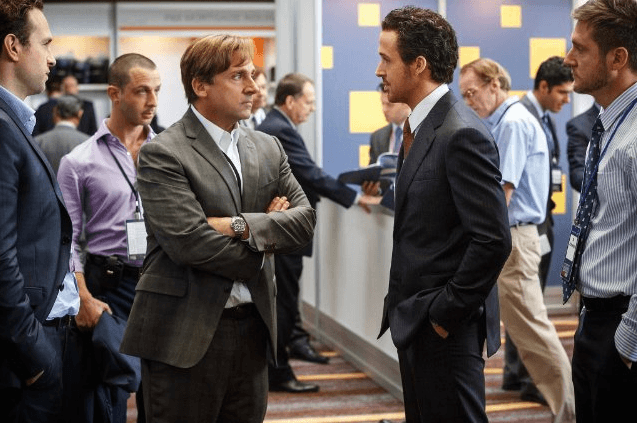The Big Short: How Adam McKay turned the 2008 financial crisis into a hugely entertaining Hollywood film
Steve Carell, Ryan Gosling and Jeremy Strong star in The Big Short.
In advance of the 88th Academy Awards on February 28, 2016, we're talking to the directors behind the five films vying to be named Best Picture, among them Adam McKay, director of "The Big Short."
Our first conversation was with Alejandro González Iñárritu, director of "The Revenant.”
McKay has made his mark on comedy many times over. But the director of “Anchorman” and “Talladega Nights” switched gears in “The Big Short,” which is about the financial collapse of 2008 and is based on Michael Lewis’ nonfiction book “The Big Short.”
“I just read this book and thought ‘Wow! This is one of the books of our time,’” McKay says. “I just feel like it kind of shows everything going on in America right now, and I just right away was like ‘I have to make this.’”
The world of Wall Street and the modern banking industry is complicated and arcane. It might not seem like an obvious choice for a director with a track record of making comedies. McKay, however, said the essence of the film came down to the real-life characters in the story.
“Right away, when I read the book, what I loved was that the information … was so fused to the characters. I'd just never seen a story that was so information-heavy, but because the characters were so great it drove you through it,” McKay says. “There haven't been a lot of Wall Street movies that really get into the details. So yeah, we made this decision that we were going to go into it.”
In the end, McKay says even the complicated financial terms and concepts weren’t too difficult to illustrate.
“It’s not as complicated as it sounds,” McKay says. “You're really moving just money and debt around and then they give it strange names and act like no one should understand. So that was kind of my approach to it — this really isn't that tricky.”
One of the techniques McKay employs to explain concepts such as mortgage bonds and CDOs is to have scenes where actors break the fourth wall and stop the action of the movie to explain important terms in understandable ways. Or he employed random celebrities to explain other topics during commercials that promoted the film.
“The idea was, you know, [in] America obviously, such a big part of our culture is sports, celebrity gossip. What would happen if real information came through from that? So, you know, it's a little bit of a poke at that side of our culture. And at the same time you get the information kind of in a fun way,” McKay says.
As part of the research and preparation for the film, McKay got to know the real-life characters in the book.
“I think the trickiest part was … [getting] to know the real people,” McKay says. “I was having dinner with them and getting e-mails from them.”
Some of the characters requested to have their names changed in the film, or to point out to the audience when certain artistic licenses were made in the film — requests that McKay honored. Other than these small changes, however, McKay says the film is pretty much exactly what happened.
“It's pretty accurate to what these guys did,” McKay says, “They didn't diverge that much. I mean, obviously there's little lines of dialogue — it's a movie … moment to moment it's not 100 percent accurate, but the actual timeline is accurate.”
There are a lot of things in “The Big Short” that diverge from a traditional Wall Street flick. McKay says that uniqueness was intentional.
“We wanted the whole movie to feel a little off balance and raggedy as opposed to, you know, a lot of the Wall Street movies always portrayed as very austere and classic,” McKay says, “We really wanted to feel the anxiety of their journey, and the fact that they're not well dressed, they're not the guys with the great haircuts, they're the oddballs.”
McKay wanted the oddball and funny moments of the film to do more than communicate the personalities of the story’s main characters, however.
“We just didn't want that monolithic, intimidating vibe to this story,” McKay says. “I feel like so many times when you talk about financing and banking, it always just seems so impressive and heavy and weighty. It's a strange thing in our culture that, for some reason, when people talk about politics or finance or international politics, there's this sense that it's boring. … But our idea was, you know, it's exciting. It's exciting to actually know what's going on, there's an energy to it.”
"The Big Short” is up for five Academy Awards — including Best Picture, Best Director and Best Adapted Screenplay.
This story first aired on PRI's Studio 360 with Kurt Andersen.
We want to hear your feedback so we can keep improving our website, theworld.org. Please fill out this quick survey and let us know your thoughts (your answers will be anonymous). Thanks for your time!
